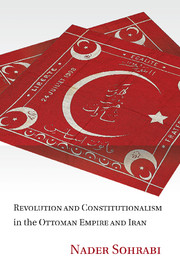Book contents
- Frontmatter
- Contents
- Acknowledgments
- Introduction
- The Ottoman Empire
- 1 Revolution and the Neopatrimonial State
- 2 The Young Turk Revolution and the Global Wave
- 3 Constitutional and Extra-constitutional Struggles
- 4 The Staff Policies and the Purges
- 5 Counterrevolution and Its Aftermath
- Iran
- Concluding Remarks
- Selected Bibliography
- Index
- References
4 - The Staff Policies and the Purges
from The Ottoman Empire
Published online by Cambridge University Press: 05 November 2011
- Frontmatter
- Contents
- Acknowledgments
- Introduction
- The Ottoman Empire
- 1 Revolution and the Neopatrimonial State
- 2 The Young Turk Revolution and the Global Wave
- 3 Constitutional and Extra-constitutional Struggles
- 4 The Staff Policies and the Purges
- 5 Counterrevolution and Its Aftermath
- Iran
- Concluding Remarks
- Selected Bibliography
- Index
- References
Summary
Nothing demonstrated more clearly the frustrations of the emerging educated middle class than its view of the internal workings of the Ottoman state. That the CUP represented this class has been a central claim of this study. Few have accorded this class the independence it deserves. It is usually seen as being under tutelage and pursuing the project of another more “fundamental” class, more closely tied to the production process, be it the (industrial) bourgeoisie or the landowners. Yet this was a cohesive and independent professional middle class, capable of pursuing programs of its own. In this so-called bourgeois revolution, it displayed strong antagonism toward the prosperous Ottoman bourgeoisie, which was ethnically distinct. On the other hand, when it did foster the development of the Turkish industrial bourgeoisie from scratch, through the planned National Economy program during the First World War, its aims were both ethnic and economic. The CUP, and the revolution, were not organic evolutionary byproducts of an economic system. The class and its programs could not be reduced to economic determinacy, and if anything, it was the emerging bourgeoisie that was under its tutelage. The Turkish bourgeoisie would not have come into existence in that shape, form, and time without the intervention of the middle class in a project that had nationalism and orientation to the state at its core.
Before concern for the economy, the CUP was focused on the blocked mobility of the emerging class. Here educational credentials were its weapon of choice. It portrayed its zeal not as expression of self-interest but a wish for the general good, adamant that its particularistic interests converged with those of the empire’s inhabitants. Its harsh staff reforms were depicted as a necessary, albeit painful, step toward saving the empire and achieving all that a rational, modern state promised. With this attitude it easily dismissed criticisms of narrow self-interestedness and focused with confidence on the “scientific” task at hand, something it could not as easily do when it came to criticisms of its constitutional conduct. No position of high rank was safe any longer. Most top administrators and military men were either guilty of connection to the sultan, or considered to be without merit or proper education. The low-ranking bureaucrats of all kinds, and military rankers, were no more secure. Their large numbers were argued to be a drain on the treasury.
- Type
- Chapter
- Information
- Revolution and Constitutionalism in the Ottoman Empire and Iran , pp. 189 - 223Publisher: Cambridge University PressPrint publication year: 2011



